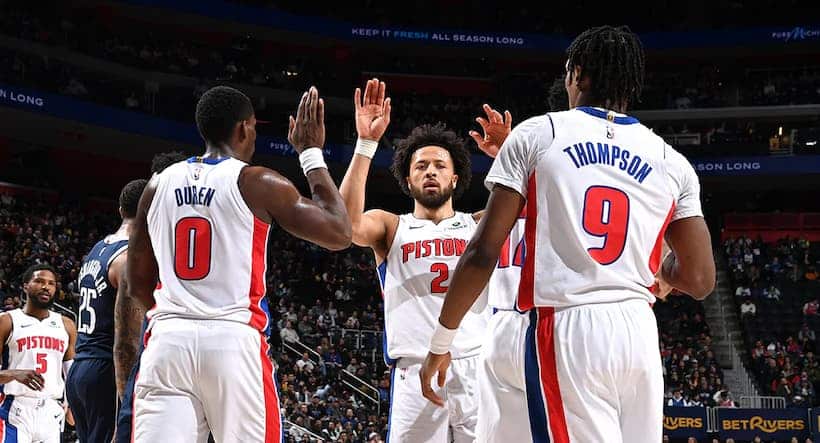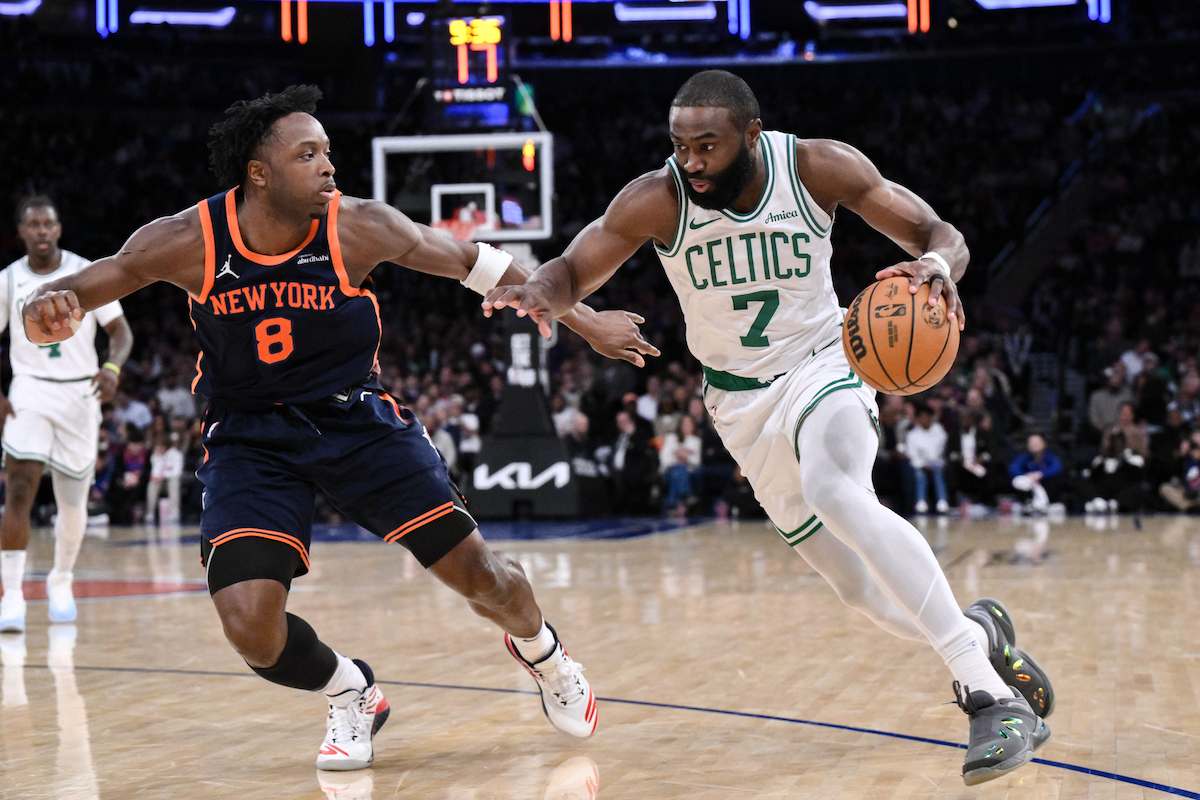What if the Boston Celtics don’t fix their biggest issue… and win the NBA Finals anyway?
I had this funny thought after Game 1, given that it featured the weakest of Celtics weaknesses: blowing massive, arguably insurmountable leads to manageable deficits in no time flat. It didn’t ultimately matter, but it got me thinking about one of the funnier possibilities for how this season could end.
Last year, the Celtics would lose games like that constantly, albeit usually not with leads that large (the Dallas Mavericks were doubled up 29-58 at one point). It’s not a unique Celtics problem, since professional NBA basketball teams will generally make a run into any lead spurred by adrenaline and the other team’s letting up.
I’m not going to bash the Celtics for taking their foot off the gas, because, well, they didn’t intentionally take any foot off of anything. It’s just human nature. I assure you this exchange did not take place during a Celtics timeout at the end of the first half:
Jrue Holiday: “Okay guys, so we’re up almost 30. I think we should probably stop trying now.”
Jayson Tatum: “Yeah that’s probably the polite thing to do.”
Derrick White: “If they get it back to single digits we can start trying again, right?”
Jaylen Brown: “Indubitably.”
Joe Mazzulla: “This is like Season 3 of Kobra Kai when Robbie felt bad so he stoppe—”
Kristaps Porzingis: “Not right now, Joe.”
What did happen was the Celtics rightly realized they were up by 29 and began subconsciously playing a different sport. When it’s a close game in the Finals, your life is on the line. You play with an urgency and intensity that flows through you naturally and at maximum output.
But up that big, killer instinct just isn’t natural. To date, I haven’t seen any stat titled “how often (player/team X) went up by 25 or more in the first half and did not allow their opponent to cut the lead down to 20 or fewer,” though that would be an awesome wrinkle in the LeBron James vs. Michael Jordan conversation.
No matter how often coaches try to do it, you can’t manufacture desperation, and the only one with intensity flowing naturally is your opponent. Luka Doncic hit some shots because he literally had to, and the Celtics missed a bunch because they didn’t have to.
However, any Celtics fan will tell you this team has historically had bigger problems than human nature. Blowing leads of 10 to 20 points usually didn’t feel like the result of any major schematic change, but rather a deer-in-the-stadium-lights quality that would see the Celtics standing around and wait for the other team to give up, while their opponents, ya know, keep playing because they’re contractually obligated to do so.
Full disclosure: this is merely my and many other fans’ perception of what is happening. They end up winning many of the games where they blow leads, so I don’t have any readily available stats that can quantify how often this happens. It’s just conjecture, but I bet it resonates.
This is just a hunch, but I wonder if what part of the game the Celtics take their leads is a factor in having them evaporate. The Celtics have such a talent mismatch on most teams that they can come out and demolish their opponent with an initial broadside. This flips the mental switch I was talking about too early, and the opponent is left with way too much time before they are morally allowed to give up.
Three-point variance is also a major factor. The Celtics shoot so many threes that massive leads like the one in Game 1 are usually the result of a huge percentage advantage from beyond the arc. But over the course of a game, that can stabilize, and it won’t look quite as destructive as it was before.
Meanwhile, the TD Garden crowd is like an Apple Watch. They’ve analyzed every single piece of data about this Celtics team; it knows their resting heart rate, average steps per day and passive aggressively calculates how many active minutes they have this week.
At the same time, any tiny change in the Celtics’ heart rate will trigger a notification that says, “STRESS SEEMS HIGH RIGHT NOW. YOU SHOULD PROBABLY TAKE A DEEP BREATH,” and if the Celtics don’t calm down and take a deep breath it will automatically dial 911 and report that the apocalypse has arrived.
The TD Garden crowd starts to murmur whenever the Celtics’ lead falters. They can see the lack of urgency and the standing around. In turn, the players then react to the crowd and start to tighten up. The collapse feeds itself, and the downward spiral turns into a straight-up tailspin.
Thankfully, the Celtics grabbed the stick and corrected course last night, salting away a 92 percent dominant win with five minutes of garbage time. And that’s all just wondering why the Celtics’ leads seem to always be as fleeting as the glance of my 6th grade crush (who I swear would look at me for like .02 seconds at a time but I promise she was actually looking at me it wasn’t that guy behind me she was looking at me and I never quite understand why she doesn’t smile or wave or anything but it’s not like her stare is mean or judgmental it’s actually really nice but I’ve still never talked to her so I don’t really know what she’s really like).
The real question is: does it even matter?
Well, the Celtics are three wins away from winning the NBA championship, and if they weren’t going to lose that game after the Mavericks cut it to 8, I’m not really sure if the “blowing leads” narrative is going to hold much more water. The Celtics could feasibly choke away three more leads and win the game anyway due to their sheer talent and mathematical advantage.
That’s the glorious part of Mazzulla Ball (the unofficial name for predicating your entire offense on getting enough threes up): many of the traditional NBA pitfalls just don’t apply. Don’t have the best player in the series for clutch time? Welp, I guess we can just go up by 25 in the fourth quarter and neutralize that problem. Playing two impossibly great mid-range shot-creators? Hmm, well three is objectively more than two so we can probably handle that.
And for our purposes, if the Celtics find themselves up 29 one moment and only up 8 the very next, it’s probably not a huge deal since the shots probably just stopped going in for a little bit and they’ll probably start going in again soon. It’s all only probably, but it’ll probably work over time.
I have spent uncountable hours worrying about the Celtics’ lack of killer instinct with a big lead, and celebrate accordingly whenever they do slam the door shut. Game 1 was somehow a weird combo of both, so I’ve decided to just throw my hands in the air and stop worrying about it. The Celtics could blow all the leads in the universe, and I’m not even sure it matters anymore.
But I am sure that I literally don’t care. Just win. Whatever it takes, just win.






